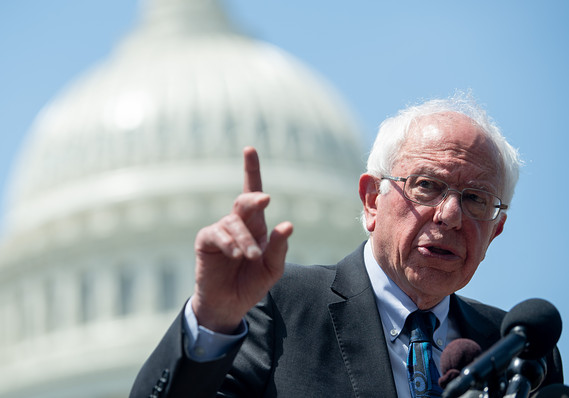 Getty Images
Getty Images Presidential contender Bernie Sanders on Tuesday said he’s going to “take on the billionaire class” by taxing their wealth up to 8% as part of a plan to pay for trillions of dollars of new or expanded social programs.
The self-avowed socialist senator from Vermont said his “tax on extreme wealth” proposal would raise almost $4.5 trillion over a decade. He would use the proceeds to pay for “Medicare for all,” universal child care and the most far-reaching affordable housing plan in American history.
The wealth tax would start at 1% for net worth above $32 million, rising to 5% for those with assets over $1 billion and reaching as high as 8% on wealth over $10 billion.
His plan is the most aggressive offered by any candidate in the Democratic primary, exceeding a similar wealth tax proposed by presidential rival Elizabeth Warren that tops out at 3%.
The plan reflects many of Sanders’ ideas over the years, but it’s also likely part of an effort to boost a campaign that appears to have lost ground to Warren and Democratic front-runner Joe Biden.
Read: U.S. consumer confidence sinks to 3-month low on trade worries, softer jobs market
A wealth tax would face myriad challenges, political, legal and logistical.
Democrats would have to hold the House and recapture control of the Republican-led Senate, for one thing.
A conservative-leaning Supreme Court would also have to find a wealth tax constitutional, an outcome that legal experts say is by no means certain. Such a tax could also be delayed for months if not years due to legal challenges.
The Internal Revenue Service would also need to be dramatically expanded to assess wealth and administer the tax, a process that other countries have found difficult. While it’s relatively easy to figure out the value publicly traded assets such as stocks or bonds, other assets such as art, real estate and privately run businesses aren’t easy to value.
As many as 14 of the world’s 36 richest countries used to have wealth taxes, but that number has dwindled to just four, according to the Tax Foundation. Such taxes rarely raised as much money as proponents claims and the wealthy found ways to evade the tax or win political exemptions.
Most recently, France ended an unpopular wealth tax in 2018 that was blamed for causing the rich to flee and curtailing investment.
Under current U.S. law, assets are generally only taxed when they are sold. Billionaires such as Microsoft MSFT, -1.30% co-founder Bill Gates and Amazon AMZN, -0.83% founder Jeff Bezos, whose fortunes are largely concentrated in company stock, don’t have to pay taxes on most of their wealth until they sell shares.
A wealth tax, by contrast, would tax Gates and Bezos each year based on the total value of everything they owned regardless of whether they sold any assets.
Democrats such as Sanders and Warren insist a wealth tax is necessary to reduce inequality in the U.S., pay for badly needed social programs and prevent a small class of wealthy elites from rigging the political system for their benefit.
“Enough is enough. We are going to take on the billionaire class, substantially reduce wealth inequality in America and stop our democracy from turning into a corrupt oligarchy,” Sanders said.
Sanders would put in place a number of measures to prevent the uber-rich from evading the levy. The government would create a national registry to track the wealthy, audit the tax returns of every billionaire each year and beef up funding for IRS staffing and enforcement.
An “exit tax” of 60% would be applied to the net value of all assets of any billionaire seeking to become a citizen of any country to avoid the levy on wealth.
Sanders said his plan would reduce the wealth of billionaires by half over a 15-year period.
Left-leaning economists Gabriel Zucman and Emanuel Saez, longtime advocates of higher taxes on the rich, estimate the wealth of the Forbes 400 richest Americans would be 60% less if Sanders’ tax had been in place since 1982.
“Instead of having a wealth of $7.2 billion on average (in 2018), they would have a wealth of $3 billion on average,” Zucman and Saez wrote in evaluating the Sanders plan at his request.










Add Comment